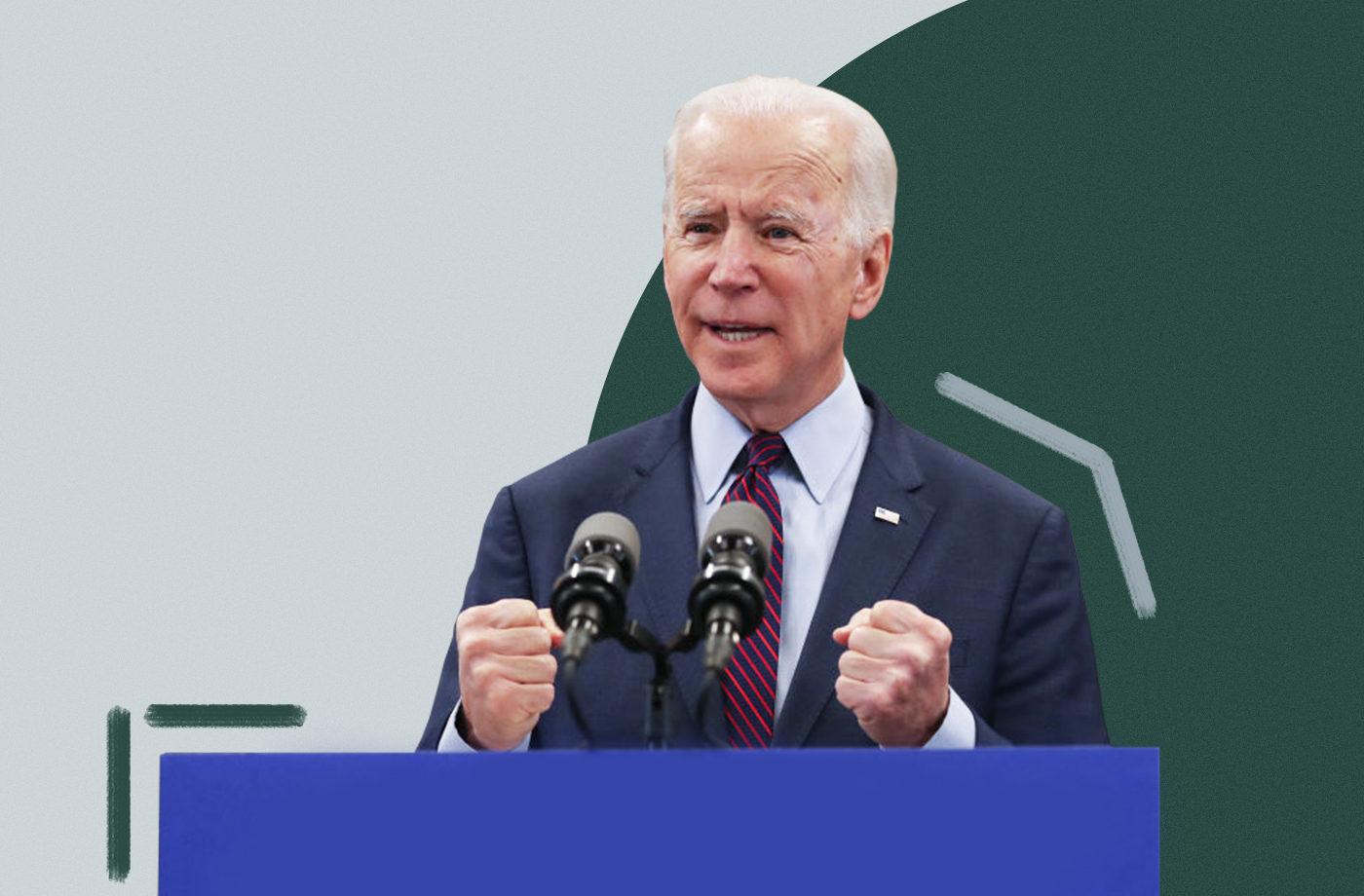
March 10, 2020 at 09:00PM by CWC
In a testament to how quickly things can change in an election season, former Vice President Joe Biden—who trailed behind Bernie Sanders (and several other candidates) in the first few primaries of the year—is now the frontrunner for the Democratic presidential nomination. His moderate views won over an unexpected 10 of the 14 states that held primaries on Super Tuesday, and he’s now leading over Sanders in the national polls. Plus, a flood of former Democratic candidates have rushed forward to endorse Biden in the past week, including Pete Buttigieg and Sens. Cory Booker (D-NJ), Kamala Harris (D-CA), and Amy Klobuchar (D-MN). Historically, every party candidate that’s been this far ahead in polls and endorsements has gone on to win the nomination, according to CNN.
Biden’s been making headlines since 1973, when he became one of the youngest people elected to the Senate at 29 years old. During his 36 years as a Delaware senator, he acted as an early champion of climate change reform and gun control. He also authored the historic Violence Against Women Act in 1994, which seeks to protect and support victims of domestic and sexual violence. But the 77-year-old politician is best known for his eight-year stint as vice president in the Obama administration. During this time, he helped pass the Recovery Act—which helped America recover from the 2008 recession by investing in clean energy—the Affordable Care Act, and a series of gun reforms after the Sandy Hook Elementary School shootings in 2012.
Biden’s centrist takes on topics like healthcare, climate change, and student debt are markedly different from Sanders’ ultra-progressive policy proposals in these same areas. So what would a Biden presidency look like when it comes to the issues that affect Americans’ wellbeing? Keep reading to find out.
Before heading to the polls, find out how Joe Biden views 6 issues related to your health and wellbeing
1. Healthcare
ADVERTISEMENT
ADVERTISEMENTKate Spade Autumn/Winter Sale |
In contrast to Sanders, who wants to eliminate private health insurance in favor of Medicare for All, Biden is looking to “protect and build on Obamacare,” or the Affordable Care Act. Not only does he have a personal stake in our current health insurance system, given his involvement with passing the Affordable Care Act, but he says that starting over with a completely new system “makes no sense” because he saw how difficult it was to pass the ACA.
Biden is, however, in favor of letting Americans purchase a public insurance plan, similar to the Medicare plan available to those 65 and older, that would cover primary care without co-pays and negotiate with medical providers to lower costs. He also wants to create a tax credit that ensures no one pays more than 8.5 percent of their annual income on a “gold,” low-deductible health insurance plan, either through the government or private insurers. Currently, coverage costs are capped at 9.25 percent of income, and they only apply to higher-deductible “silver” plans and those making 400 percent or less of the federal poverty level—about $50,000 for a single person and $100,000 for a family of four.
Biden is also committed to limiting prescription drug prices, protecting abortion rights (despite the fact that he voted to let states overturn Roe v. Wade in 1981), restoring federal funding for Planned Parenthood, improving access to mental health care, ending the opioid crisis, and reducing the maternal mortality rate, which is particularly high among women of color.
2. Climate Change
Biden has a strong legacy of environmental advocacy on the political stage. He introduced one of the first climate change bills to Congress in 1986, and as vice president he oversaw the Recovery Act, which directed a record-setting $90 billion to clean energy investments. He considers climate change a foreign policy and national security issue, and is seeking to put it at the forefront of strategies in both of these arenas.
Like Sanders, Biden is committed to achieving net-zero carbon emissions by 2050 by fully transitioning the country to clean energy. However, his “Clean Energy Revolution” plan does not as closely mirror Rep. Alexandria Ocasio-Cortez (D-NY) and Sen. Edward J. Markey’s (D-MA) Green New Deal, which forms the basis of Sanders’ climate change plan.
Biden is planning to prioritize the environment from day one in office by re-entering the Paris Agreement and signing executive orders setting “aggressive” methane emissions limits for the oil and gas industries, committing to clean-energy solutions for government buildings and transportation, protecting public land, and creating new energy efficiency standards for vehicle and appliance manufacturers and builders, among other things. By the end of his first term he plans to make a “historic” investment—$400 billion over 10 years—in research and innovation around clean energy technology, while also making polluters responsible for the cost of their emissions.
Biden also wants to help create climate-friendly solutions on the local level—working with communities to fund public transportation improvements (while also creating the “cleanest, safest, fastest” interstate train network in the world); building more housing near public transit; protecting low-income communities and communities of color from the disproportionate amount of pollution they’re exposed to; and creating new low-carbon manufacturing industries in each state. Internationally, Biden wants the United States to persuade other countries to make greater reductions to their carbon outputs while penalizing countries that aren’t doing their part.
All in all, Biden’s climate proposal would cost $1.7 trillion over the next 10 years. He says he’d pay for it by ending fossil fuel subsidies, reversing Trump-era tax cuts for businesses, and making other changes to tax laws and loopholes that favor corporations and the wealthy.
3. Financial Wellness
Unlike Sanders, Biden isn’t seeking to eliminate medical or student loan debt. He does, however, want to make income-based student loan repayment programs more affordable by capping federal loan payments at 5 percent of a person’s discretionary income over $25,000. Those making under $25,000 would not be required to make payments on federal loans, nor would they accrue interest on their loan balance.
Another place where Sanders and Biden differ is when it comes to higher education costs. Where Sanders has vowed to eliminate all tuition and fees at public colleges and universities, Biden’s more moderate plan is to give “every hard-working individual“—including older adults, part-time students, and DREAMers—a free two-year community college education. (This is essentially an expansion of the Obama-era College Promise program.) Students under this program could then go on to attend a four-year institution, including historically Black universities or other minority-serving institutions, and have much of the cost covered by the state and federal governments. These schools would receive over $70 billion in government investment to improve facilities, increase student retention, and connect students with post-collegiate career pathways.
Biden proposes paying for his higher-education plan by eliminating tax loopholes and capping tax deductions for the wealthiest Americans.
4. Equality for All
Although he has a history of voting against policies that would benefit the LGBTQ+ community, Biden became the highest-ranking public official to endorse marriage equality in 2012, and he has a very detailed, 50-policy proposal for continuing to support and protect LGBTQ+ people during his presidency. He plans to reduce discrimination and violence against people of all ages by passing bills such as the Equality Act and Safe Schools Improvement Act, and he’s seeking to eliminate suicide and homelessness among LGBTQ+ young people by passing legislation and devoting resources to programs in these areas.
ADVERTISEMENT
ADVERTISEMENTSports Direct Free Delivery on All Orders! |
Biden is also committed to reforming the prison and criminal justice systems to help prevent incarcerations, minimize prison terms, and provide housing and other services for former prisoners upon release—all of which would have an outsized impact on people of color, who are overrepresented in the prison system currently.
Plus, as the author of 1994’s Violence Against Women Act, Biden remains committed to protecting women’s safety and rights. His comprehensive plan would expand access to housing, legal support, and financial assistance for survivors of domestic and sexual violence; expand violence-prevention education in schools and colleges; and create a task force and funding addressing online harassment and abuse, among other initiatives—with a particular focus on serving women in marginalized communities. It’s worth noting that over the past year, several women have accused Biden of touching or speaking to them in ways that made them uncomfortable. However, that hasn’t hurt the former VP’s standings with female voters in this election.
5. Gun Safety
Biden is a longtime champion of gun control—in 1993 he helped pass the Brady Bill, which established the federal background check program for gun purchases, and the following year he teamed up with Sen. Dianne Feinstein (D-CA) to institute a 10-year ban on assault weapons and high-capacity magazines. These bans expired during during the presidency of George W. Bush, but Biden says he wants to bring them back while closing various loopholes in the federal background check system and banning online gun sales, among many other proposed policies.
His gun safety plans go beyond just the point of purchase. The former vice president also wants to take steps to reduce gun-inflicted suicides and urban gun violence while creating a network of trauma care centers for survivors of violence—gun violence included.
6. Marijuana POLICY
Biden’s views on cannabis are much more conservative than Sanders’, who has promised to federally legalize cannabis within the first 100 days of his presidency. Biden, on the other hand, is not in favor of nationwide legalization, as he believes that more research needs to be done on the plant’s health impacts on humans over time. But his views on marijuana have changed a bit since his days as a staunchly anti-drug Senator—now, Biden supports making marijuana possession a civil offense, rather than a criminal one, and automatically overturning all past criminal convictions related to cannabis. He would also let states continue to determine their own cannabis policies, which would mean business as usual for the 44 states that have legalized either recreational or medicinal cannabis so far.
Biden is a Scorpio, which places him in good company—the majority of U.S. presidents have also had fixed zodiac signs. And while a woman won’t be in that contingent any time soon, here’s why we desperately need one in the highest office.
Author Erin Magner | Well and Good
Selected by CWC

ADVERTISEMENT
ADVERTISEMENTUp to 30% off Gift Sets |







